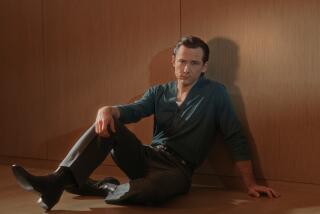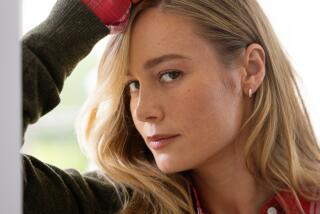Better Living Through Alchemy : THE CHYMICAL WEDDING <i> by Lindsay Clarke (Alfred A. Knopf: $19.95; 536 pp., 0-394-57937-2) </i>
- Share via
The alchemist was the forerunner of the modern chemist, just as the astrologer was the forerunner of the modern astronomer. When one considers the growing influence of astrology in recent decades--from its role in the ‘60s counterculture and subsequent infiltration of conventional chatter (“What’s your sign?”) to its dramatic elevation to high office in the person of the Reagan White House astrologer--should it be so surprising to come across a novel that seriously advocates the idea of better living through alchemy?
Looking backwards through the keen lenses of modern natural science, we visualize the medieval alchemist as a confused figure: a charlatan or true believer who tried to convert “baser” (i.e., less precious) metals into gold. We think of alchemy as a pseudo-science claiming to change the physical world through spiritual, or “magic,” power. Orthodox Christian contemporaries of alchemists looked askance at this abuse of spiritual power for materialistic ends. Rationalists doubted the claims of alchemists; the pious half-believed and disapproved.
In “The Chymical Wedding,” the second novel of British writer Lindsay Clarke (and the winner of the Whitbread Award for best novel of the year), alchemy is presented as a spiritual process with spiritual goals--or, rather, as a quest for the fusion of material and spiritual worlds, endowing matter with spirit and making the spiritual world as “real” as the physical one. Historically, this is not illegitimate, for alchemy, cabalism, Gnosticism, witchcraft and Neoplatonism can be viewed as distinct yet intermingling streams in the lore of the occult.
The occult often is mystical, but not always. Ideas declared heretical by the early Christian orthodoxy (including some that we might now judge scientifically sound) were sometimes kept alive as part of “occult”--literally, “hidden”--tradition. Followers of the occult had a knack for being rationalistic when the surrounding religious orthodoxy demanded faith alone, but for looking irrational compared with the modern scientific method, whose eventual triumph dealt a second devastating blow to these arcane forms of learning. Yet, in times of stress, when we are prone to doubt ourselves and our orthodoxies, the appeal of the occult grows stronger.
Clarke, needless to say, is not concerned with specific formulas to change lead into gold, but rather with the change of outlook that might replace the mentality that (in Wordsworth’s phrase) “murder(s) to dissect” with a more holistic one. Alchemy in “The Chymical Wedding” represents a quasi-Romantic, vaguely Blakean marriage of opposites: dark and light, male and female, spiritual and physical. In keeping with the mythologizing tendencies of such an enterprise, Clarke assembles two sets of characters to play out a pair of parallel stories--one unfolding in the 1980s, the other in the 1820s--which manage to intersect in mysterious ways.
The suggestively named Alex Darken is a young poet in retreat from a failed marriage. Taking refuge at his publisher’s cottage in a small English village in Norfolk, Alex encounters Edward Nesbit, an irascible old poet whose early verses Alex once admired extravagantly, and a young American named Laura, who seems to be attached to him. Edward mocks and entices Alex by reading him his fortune from tarot cards. Soon, despite his continuing skepticism, Alex is drawn into Edward and Laura’s obsession with alchemy and into their personal lives.
Edward and Laura have been researching the story of another old man and young woman--in this case, a father and daughter--Henry and Louisa Agnew, alchemical adepts who lived in the village back in the 1820s. The two narratives are interwoven. While Henry labors in vain on his lifelong project of a poem setting forth the mysteries of alchemy, his daughter Louisa is writing a prose prolegomenon to his work, which she calls “An Open Invitation to the Chymical Wedding.” Precisely what became of her work is a mystery that the modern-day “researchers” are trying to solve.
Just as Edward and Laura are joined by Alex Darken, so Henry and Louisa become involved with a newcomer to their neighborhood, a troubled young clergyman, Edwin Frere (another deliberately suggestive name, meaning brother in French). Like Alex, Edwin has problems in his marriage. The relationship that flowers between the passionate yet inhibited clergyman and the wise and beautiful Louisa finds a parallel and a contrast in the one that develops between Alex and Laura. Indeed, in some ways, the latter-day relationship is a “working out” of the earlier one.
For my taste, the 19th-Century story line is the stronger of the two, both because it is innately more dramatic and because it captures that quintessentially 19th-Century blend of evangelical piety and scarcely submerged erotic passion. It is a set-piece, but a well-polished, nicely mounted one. The modern subplot has the typical late 20th-Century mix of broken marriages, spontaneous love-making, and dread of nuclear war (attending a Campaign for Nuclear Disarmament meeting, Alex wonders if alchemy can help us out of the pass to which we’ve brought ourselves). But this mix is a little muddled and pallid.
We sense we’re in trouble early on when cantankerous old Edward warns Alex that “poetry is not enough.”
By the end, it seems that alchemy is not enough either--or, as the novel disingenuously implies, that it’s too much for flawed human beings to handle (in which case, it is no more of a “solution” than the science, philosophy, religion, politics or poetry it set out to replace).
Clarke’s lush storytelling leads us through a circular maze located somewhere between the realms of possible enchantment and passable entertainment. But by the time we’ve emerged from the foliage and looked back on the labyrinth, it already seems a little too stagy to take to heart.
More to Read
Sign up for our Book Club newsletter
Get the latest news, events and more from the Los Angeles Times Book Club, and help us get L.A. reading and talking.
You may occasionally receive promotional content from the Los Angeles Times.








